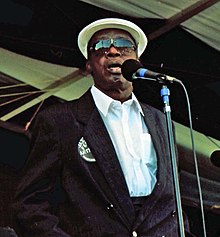Jessie Hill
Jessie Hill | |
|---|---|
 Jessie Hill at New Orleans Jazz & Heritage Festival, 1996. | |
| Background information | |
| Born | December 9, 1932 New Orleans, Louisiana, United States |
| Died | September 17, 1996 (aged 63) New Orleans, Louisiana |
| Genres | R&B Louisiana blues |
| Occupation(s) | Singer, songwriter |
| Instruments | Vocals |
| Years active | 1951–1996 |
| Labels |
|
Jessie Hill (December 9, 1932 – September 17, 1996)[1] was an American R&B and Louisiana blues[2] singer and songwriter, best remembered for the classic song "Ooh Poo Pah Doo".[1][3]
Life and career[]
Hill was born in New Orleans, Louisiana, United States. By his teens he was playing drums in local bands, and in 1951 he formed his own group, the House Rockers. After periods performing as drummer with Professor Longhair and then Huey "Piano" Smith, Hill formed a new version of the House Rockers in 1958, which enabled him to focus on singing with the band.[1]
The origins of "Ooh Poo Pah Doo" were apparently created from a tune played by a local pianist, who was known only as Big Four. Hill wrote the lyrics and melody, later expanding the work with an intro taken from Dave Bartholomew. It was further honed on stage, before Hill recorded a demo that he shopped to local record labels, finally recording a session at Cosimo Matassa's studio produced by Allen Toussaint.
Upon its 1960 release on Minit Records, "Ooh Poo Pah Doo" emerged as a favorite at Mardi Gras, selling 800,000 copies and reaching #3 on the Billboard R&B chart and #28 in the Billboard Hot 100 pop chart.[4][1][5] There have been over 100 cover versions of "Ooh Poo Pah Doo" recorded and performed live over the years by other popular musicians.[5]
His follow-up "Whip It On Me" reached #91 on the Billboard Hot 100 in 1960.[4] Further recordings in New Orleans were less successful, and he moved to California to work with fellow New Orleans musicians including Harold Battiste and Mac Rebennack. In this period, he wrote songs recorded by Ike and Tina Turner, Sonny and Cher, and Willie Nelson.[1]
A 1972 solo album was unsuccessful, and he began to suffer financial difficulties exacerbated by a drinking problem. These problems continued after his return to New Orleans in 1977, and several benefit gigs did little to revive his personal or professional fortunes.[1]
Death and legacy[]
Hill died of heart and renal failure in New Orleans in September 1996, at the age of 63.[1][6] He is buried in Holt Cemetery in New Orleans, in a pauper's grave for the poorest citizens of the city.[5]
Two of his grandsons are James and Troy "Trombone Shorty" Andrews. The pair performed "Ooh Poo Pah Doo" in Episode 7 of the HBO series Treme.[7] A third grandson, Travis "Trumpet Black" Hill, was a rising New Orleans-based performer. Trumpet Black died from an infection while on tour in Tokyo on May 4, 2015.[8]
On June 25, 2019, The New York Times Magazine listed Jessie Hill among hundreds of artists whose material was reportedly destroyed in the 2008 Universal fire.[9]
See also[]
References[]
- ^ Jump up to: a b c d e f g "Biography by Jason Ankeny". Allmusic.com. Retrieved September 2, 2011.
- ^ Du Noyer, Paul (2003). The Illustrated Encyclopedia of Music (1st ed.). Fulham, London: Flame Tree Publishing. p. 180. ISBN 1-904041-96-5.
- ^ Alison Fensterstock (9 December 2014). "A birthday party for the late New Orleans R&B icon Jessie Hill, at Ooh Poo Pah Doo Bar Monday night". Nola.com. Times-Picayune. Retrieved 2 November 2015.
- ^ Jump up to: a b "Jessie Hill Chart History". Billboard.
- ^ Jump up to: a b c Jeff Hannusch (1 February 2002). "Masters Of Louisiana Music: Jessie Hill". OffBeat magazine website. Retrieved 2 November 2015.
- ^ "R&B Singing Legend Jessie Hill Is Dead". Times Picayune. 24 September 1996. Retrieved 2 November 2015.
- ^ "'Treme,' Episode 7: Civil Dysfunction Meets Civil Disobedience". NPR.org. 24 May 2010. Retrieved 2 November 2015.
- ^ "Travis 'Trumpet Black' Hill, rising New Orleans trumpeter, has died at 28". NOLA.com. Retrieved 2 November 2015.
- ^ Rosen, Jody (June 25, 2019). "Here Are Hundreds More Artists Whose Tapes Were Destroyed in the UMG Fire". The New York Times. Retrieved June 28, 2019.
External links[]
| Wikimedia Commons has media related to Jessie Hill. |
- 1932 births
- 1996 deaths
- Rhythm and blues musicians from New Orleans
- African-American singers
- American rhythm and blues musicians
- American rhythm and blues singers
- Songwriters from Louisiana
- American male singers
- American blues singers
- Louisiana blues musicians
- Chess Records artists
- Deaths from kidney failure
- 20th-century American singers
- Singers from Louisiana
- 20th-century male singers
- Minit Records artists
- Downey Records artists
- Wand Records artists
- Blue Thumb Records artists
- African-American songwriters